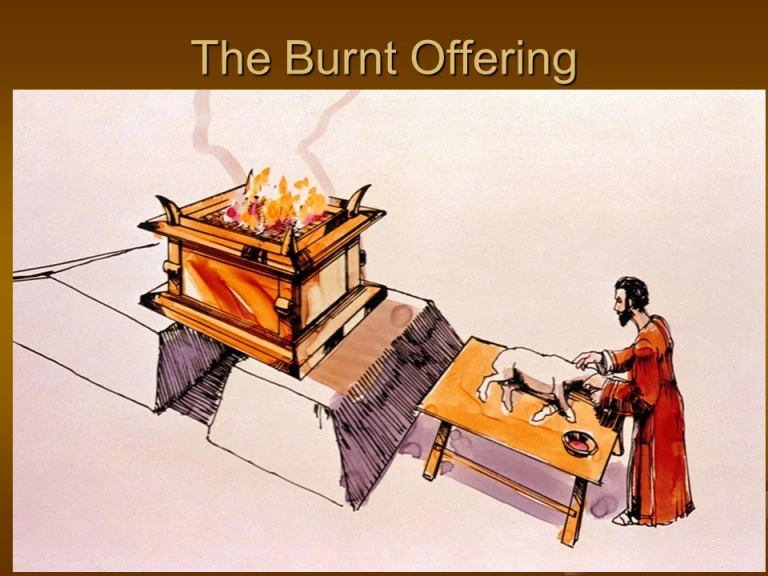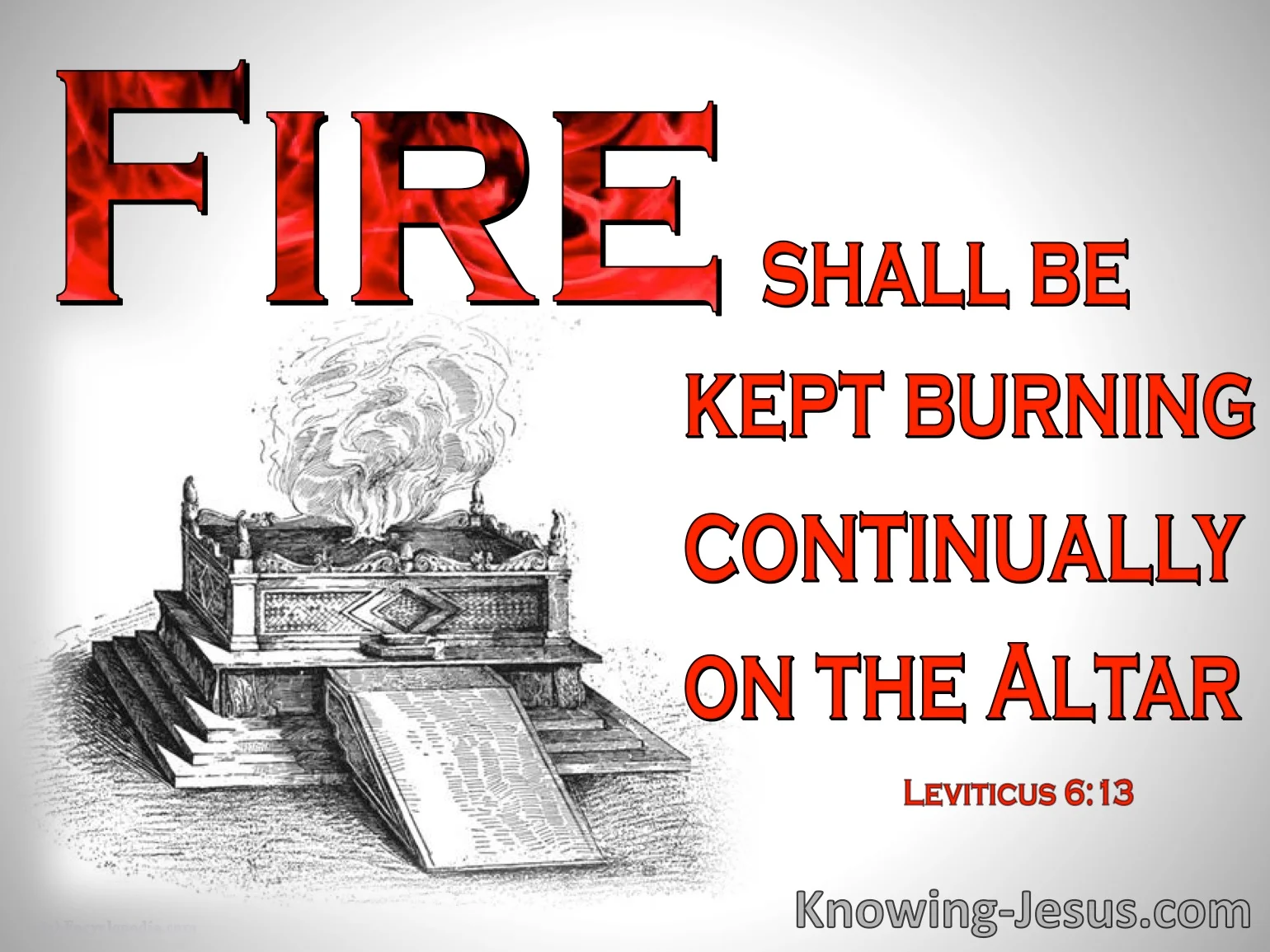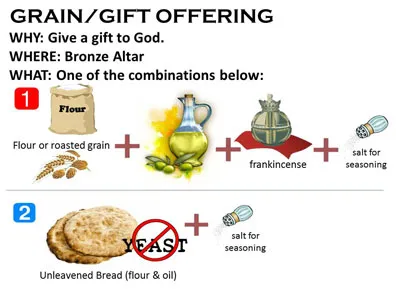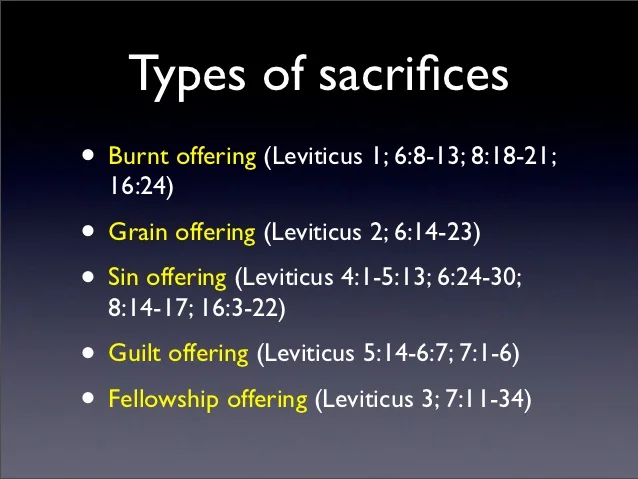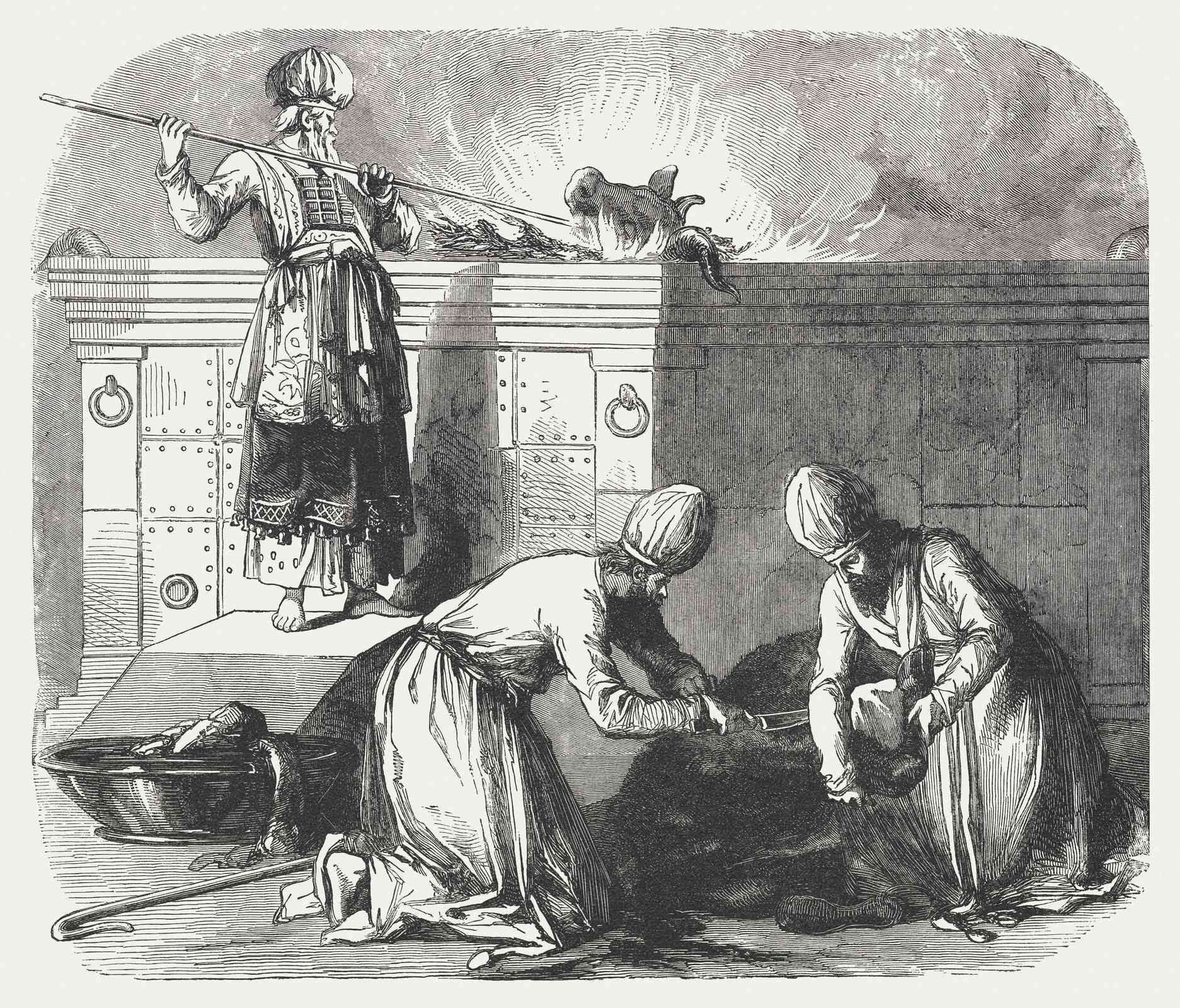Leviticus 6:8-30: Lessons from the Burnt, Grain, and Sin Offerings on Being Part of Jesus’ Nation of Priests
Introduction. Chapters 1 through the first seven verses of Chapter 6 of Leviticus provides God’s instructions on how to find, restore, and maintain fellowship with Him. Chapters 6 through 10 advise the priests of their duties in helping others prepare their sacrifices and how to remain set apart from the world and holy for God’s use. To many, these instructions may seem to have no application to modern life. If we assume that the instructions were only meant for the Levite priests when they performed animal sacrifices thousands of years ago, these chapters are in fact irrelevant to modern life. Yet, these assumptions are incorrect. Today, any believer in Jesus is part of His “holy priesthood.” (1 Pet. 2:5, 9; Rev. 1:6). The sacrifices that we perform are “spiritual sacrifices” (1 Pet. 2:5). The meanings behind these instructions to believers come to life once we understand the symbolic meaning of each sacrifice. These chapters in fact offer many highly practical instructions regarding how Christians are to help new believers both through their actions and their examples.
In this portion of Leviticus Chapter 6, God provides seven important lessons. First, as part of God’s “holy priesthood,” it is every believer’s duty to help others become transformed through Jesus Christ and the Holy Spirit. Second, while living in the world to help others, believers must keep themselves set apart from the unclean things of the world. Third, a priest for God must always put the needs of others first and be available to help others at all times. Fourth, a priest for God must be an example by offering his or her life as a living sacrifice for Him. Fifth, being part of God’s holy priesthood also requires that a believer stay in communion with Him by regularly reading His Word. Sixth, God instructs that His priests should pray at least twice a day and be led by the Spirit in all that they do. Finally, a priest must be cleansed by Christ’s blood and broken of their own will.
1. A Priest for God Must Help A New Believer Become Transformed For God. Lev. 6:8-9.
Through Christ our old flesh is burned at the cross. God repeated the law of the burnt offering as it applied to those who administered it: “Then the LORD spoke to Moses, saying, Command Aaron and his sons, saying, ‘This is the law for the burnt offering: the burnt offering itself shall remain on the hearth on the altar all night until the morning, and the fire on the altar is to be kept burning on it.”’ (Lev. 6:8-9). Christ was the burnt offering. He died on the cross. Through Him, our old selves were also burned away: “knowing this, that our old self was crucified with Him, in order that our body of sin might be done away with, so that we would no longer be slaves to sin;” (Rom. 6:6). “Therefore if anyone is in Christ, he is a new creature; the old things passed away; behold, new things have come.” (2 Cor. 5:17). “Moreover, I will give you a new heart and put a new spirit within you; and I will remove the heart of stone from your flesh and give you a heart of flesh.” (Ez. 36:26). Yet, we cannot get to heaven unless we are born again through Jesus: “Truly, truly, I say to you, unless one is born again he cannot see the kingdom of God.” (Jo. 3:3).
Image credit1
We must make sure our own flesh is reduced to ashes to be a priest for God. As priests, we must stay at the altar to keep the old flesh from reemerging: “[I]n reference to your former manner of life, you lay aside the old self, which is being corrupted in accordance with the lusts of deceit, . . ” (Eph. 4:22). We must do this daily the same way that we put on clothes: “put on the new self, created to be like God in true righteousness and holiness.” (Eph. 4:24; Col. 3:9). Yet, we sometimes remove our old flesh from the altar of purification. Pride and the lusts of the flesh pull us away from Christ. When that happens, our old selves can resurface. We become addicted to unholy things and worldly in our walk. If we allow this to happen, the works of our flesh will not be pleasing to God (Gal. 5:19-21). Have you pulled yourself away from Christ’s altar long enough for the old flesh to reemerge?
When a new believer accepts Christ, the priest must make sure the old life fully burns away. It was the priest’s role to make sure that each person’s sacrifice was burned long enough to turn it into ashes (Lev. 6:9). As part of God’s holy priesthood, we must help new believers and others to make sure they don’t walk away from the transformation process. If someone you know has accepted Christ, are you helping to mentor them? Does your church follow up regularly with new believers? Does your church have accountability relationships? Or, do people simply float in and out of church on Sunday with no oversight?
2. A Priest For God Helps Others Without Becoming Contaminated By Sin. Lev. 6:10-11.
Our contact with the world requires constant purification. The priest had the role of cleaning up the ashes and disposing of them outside the camp. This process was dirty. To stay clean, God required that the priest was to have a linen robe and undergarments to protect his flesh from the ashes of the sin offering. “The priest is to put on his linen robe, and he shall put on undergarments next to his flesh; and he shall take up the ashes to which the fire reduces the burnt offering on the altar and place them beside the altar.” (Lev. 6:10). After cleaning up the ashes, the priest changed his clothes again to throw the ashes away. “Then he shall take off his garments and put on other garments, and carry the ashes outside the camp to a clean place.” (Lev. 6:11). As non-believers approach us, we must help. Yet, we must also be careful not to become dirtied by their sins: “Pure and undefiled religion in the sight of our God and Father is this: . . . to keep oneself unstained by the world.” (Jam. 1:27). For example, it is noble to help an alcoholic break an addiction. Yet, hanging out with an alcoholic in a bar will likely place you in a situation where you are likely to face your own temptations. Do you set boundaries for yourself and for your kids in where you go in the world to help others? Or, is your problem that you are not helping others?
God is concerned about the purity that no one else can see. No one else could see if the priest was wearing linen undergarments. Only the priest and the Lord would know. Yet, God cared about these hidden details: “You shall make for them linen breeches to cover their bare flesh; they shall reach from the loins even to the thighs. They shall be on Aaron and on his sons when they enter the tent of meeting, or when they approach the altar to minister in the holy place, so that they do not incur guilt and die. It shall be a statute forever to him and to his descendants after him.” (Ex. 28:42-43). This tells us that God cares more about inner purity than outward appearances. He knew that any private sin of the priest would not stay private for long. Is there any sin that you have tried to keep private? If so, it will also grow until it is obvious to others.
Let God provide your garments. Our garments symbolize our outward acts. Our own works in helping others are nothing but filthy rags to God if we do them for our own glory. “For all of us have become like one who is unclean, and all our righteous deeds are like a filthy garment; and all of us wither like a leaf, and our iniquities, like the wind, take us away.” (Is. 64:6). Thus, our motive in helping matters. Unless we are clothed in God’s holy garments (His righteousness and not our own), we cannot be in His presence. Jesus makes this clear through His parable about the man thrown out of God’s wedding feast because he did not have a wedding garment (Matt. 22:11-14; Rev. 16:15). God also clothed Adam and Eve after they sinned (Gen. 3:21). We must help others for the glory of Christ and not ourselves. If we overcome the world through Christ, He will clothe us in righteousness in heaven (Rev. 3:4-5).
3. A Priest for God is Always Available to Help Others. Lev. 6:12-13.
Always be ready to help others find Christ. The priest was told to keep the fire burning at all times, both day and night. “The fire on the altar shall be kept burning on it. It shall not go out, but the priest shall burn wood on it every morning; and he shall lay out the burnt offering on it, and offer up in smoke the fat portions of the peace offerings on it. Fire shall be kept burning continually on the altar; it is not to go out.” (Lev. 6:12-13; same 6:9). The fire symbolizes God’s judgment that will never go out (Mk. 9:43-50; Rev. 14:10; Ps. 119:160). The fire for the burnt offering was where a person atoned for their sins by casting their sins onto the blood of another “without defect.” (Lev. 1:3, 4). This foreshadows what Jesus did for us: “[Y]ou were not redeemed with perishable things like silver or gold from your futile way of life inherited from your forefathers, but with precious blood, as of a lamb unblemished and spotless, the blood of Christ.” (1 Pet. 1:18-19; Mk. 14:24; 2 Cor. 5:21; Is. 53:4-5, 10, 12). If a new believer wants to come forward to the altar and cast their sins onto Christ, you need to be there for that person, i.e., keeping the fire ready for them. The fire was supposed to be burning both day and night. If someone calls you at 3:00 am looking to find the answers for their sorrows in life, you need to be ready at all times to serve at God’s altar. God does not want you to defer the seeker’s questions until the time is convenient for you. Do you make yourself available to help others at all times?
Image credit2
You cannot help others find Christ if you don’t know God’s word. We are told to be prepared: “always being ready to make a defense to everyone who asks you to give an account for the hope that is in you, yet with gentleness and reverence.” (1 Pet. 3:15). “Let your speech always be with grace, as though seasoned with salt, so that you will know how you should respond to each person.” (Col. 4:6). Can you explain God’s Word to others? If a non-believer or if a struggling believer came to you with questions about Christ, would you know what to say?
4. A Priest For God Leads by Example By Offering His Life to God. Lev. 6:14-15.
Others won’t take your advice about Christ if you are not following it. The God also told the priest to make a grain offering after helping a person with their burnt offering of atonement. ‘“Now this is the law of the grain offering: the sons of Aaron shall present it before the LORD in front of the altar. Then one of them shall lift up from it a handful of the fine flour of the grain offering, with its oil and all the incense that is on the grain offering, and he shall offer it up in smoke on the altar, a soothing aroma, as its memorial offering to the LORD.”’ (Lev. 6:14-15). Atonement (the acknowledgement of Christ’s death for us) must always precede sanctification (our works done in gratitude for Christ). The priest was to be a “living sacrifice” for God: “Therefore I urge you, brethren, by the mercies of God, to present your bodies a living and holy sacrifice, acceptable to God, which is your spiritual service of worship.” (Ro. 12:1). What kind of example are you to others with your life?
Image credit3
Your life offering has seven elements. Four of the seven elements for an effective life offering are repeated here. These include being: (1) led by the Holy Spirit (the oil) (Lev. 6:15; 2:1-2; 1 Sam. 16:13); (2) allowing the Spirit to crush selfish will (the “fine flour”) (Lev. 6:15; 2:1, 7; Jo. 6:34; 2 Cor. 4:8); (3) being in regular prayer (the “incense”) (Lev. 6:15; 2:2; Ps. 141:2; Rev. 5:8; 8:3); (4) having a life without intentional sin (the “unleavened bread”) (Lev. 6:16; 2:4, 11; 1 Cor. 5:6-8; Gal. 5:9); (5) leading a life that convicts others of sin and causes others to thirst for the living water of God (the salt) (Lev. 2:13; Matt. 5:13); (6) denying the flesh to allow God to fill us with the joy of the Holy Spirit (the honey) (Lev. 2:11); and (7) sharing with others (Lev. 2:10; 2 Cor. 9:6, 8-14).
5. A Priest For God Dines on the Bread of Life – God’s Word. Lev 6:16-18.
We eat the Holy Communion of Christ to remember His sacrifice. While helping others, God allowed the priests to eat parts of the sacrifice because He had made it holy. “What is left of it Aaron and his sons are to eat. It shall be eaten as unleavened cakes in a holy place; they are to eat it in the court of the tent of meeting. It shall not be baked with leaven. I have given it as their share from My offerings by fire; it is most holy, like the sin offering and the guilt offering. Every male among the sons of Aaron may eat it; it is a permanent ordinance throughout your generations, from the offerings by fire to the LORD. Whoever touches them will become consecrated.” (Lev. 6:16-18). Christ was the living sacrifice for us. When we eat communion, we do so to remember Him. At the Last Supper, “Jesus took some bread, and after a blessing, He broke it and gave it to the disciples, and said, ‘Take, eat; this is My body.”’ (Matt. 26:26; 1 Cor. 11:24). Anyone who touched the grain offering became “consecrated” or holy (Lev. 6:18). Jesus likewise consecrated the woman who bled for 12 years and cured her of her illness after she touched Him (Matt. 9:20-29). The priest, however, was only allowed to eat the sacrifice at the court of the Tent of Meeting to keep it holy (Lev. 6:16). We are likewise warned never to be flippant or irreverent when we take communion (1 Cor. 11:27-28). Has communion become a routine for you? Do you think of ways to draw closer to Him when you take communion?
Image credit4
We also consume the holy sacrifice when we read God’s Word. Christ reveals that God’s Word is also part of our holy food. “Man shall not live on bread alone, but on every word that proceeds out of the mouth of God.” (Matt. 4:4). He was the Word that became flesh (Jo. 1:1, 14). When God’s people were in the wilderness for 40-years, He fed them with “manna” from heaven (Ex. 16:35). Jesus later revealed that He was the manna which sustained them (Jo. 6:31-35). Are you meditating upon every His manna, the Word of God? “My eyes anticipate the night watches, that I may meditate on Your word.” (Ps. 119:148). Do you use the Word to choose the right path in life? “Your word is a lamp to my feet and a light to my path.” (Ps. 119:105).
We also give, to give to those in ministry. The offering also sustained the priests (Lev. 6:15-18). All of the money that you receive comes from God. “Every good thing given and every perfect gift is from above, coming down from the Father of lights, with whom there is no variation or shifting shadow.” (Ja. 1:17). With His money, you are also encouraged to tithe to help others. Without our tithes, church leaders and missionaries cannot do their job. When you withhold your tithes, you are in effect saying that your wants are more important than the needs of those serving His Kingdom full time. Are you supporting God’s workers?
6. A Priest For God Prays Twice Daily and Is Led by the Spirit. Lev. 6:19-23.
Pray at least two times a day. The burnt offering was a soothing aroma to God. “Then the LORD spoke to Moses, saying, This is the offering which Aaron and his sons are to present to the LORD on the day when he is anointed; the tenth of an ephah of fine flour as a regular grain offering, half of it in the morning and half of it in the evening. It shall be prepared with oil on a griddle. When it is well stirred, you shall bring it. You shall present the grain offering in baked pieces as a soothing aroma to the LORD.” (Lev. 6:19-21; same 1:9; Ex. 29:18; Nu. 18:17). Christ’s sacrifice later became that soothing aroma: “and walk in love, just as Christ also loved you and gave Himself up for us, an offering and a sacrifice to God as a fragrant aroma.” (Eph. 5:2). Today, we can create a soothing aroma to God through our prayers: “May my prayer be counted as incense before You; the lifting up of my hands as the evening offering.” (Ps. 141:2). “When He had taken the book, the four living creatures and the twenty-four elders fell down before the Lamb, each one holding a harp and golden bowls full of incense, which are the prayers of the saints.” (Rev. 5:8; 8:3). The priests created a soothing aroma through incense (prayer) in the morning and in the evening every day (Lev. 6:20; Ex. 30:7-8). The Psalmist also prayed in the morning: “In the morning, O Lord, You will hear my voice; in the morning I will order my prayer to You and eagerly watch.” (Ps. 5:3; 55:17; 59:16; 88:13). The Psalmist also prayed in the evening: “May my prayer be counted as incense before You; the lifting up of my hands as the evening offering.” (Ps. 141:2; Ex. 30:8). The Bible records their acts of worship and devotion as an example to follow. Thus, at a minimum, you should pray at least twice a day. Are you meeting this minimum expectation for being part of Christ’s holy priesthood?
Leave nothing for yourself. The priest was to also make a grain offering. Yet, it was entirely to be burned up as an offering to the Lord. “The anointed priest who will be in his place among his sons shall offer it. By a permanent ordinance it shall be entirely offered up in smoke to the LORD. So every grain offering of the priest shall be burned entirely. It shall not be eaten.” (Lev. 6:22-23). A priest for God cannot hold back any portion of his or her life in service to God. Have you given over your best abilities for God’s service?
Be led by the Holy Spirit. The offering of the priest also had to be “well stirred” with oil (Lev. 6:21). Oil is a symbol of the Holy Spirit (1 Sam. 16:13). The Holy Spirit must lead everything that we do with our lives. Are you praying before you make major decisions or before you confront someone? If you are faithful to pray, God will answer you: “But if any of you lacks wisdom, let him ask of God, who gives to all generously and without reproach, and it will be given to him.” (Jam. 1:5).
7. A Priest Must Be Cleansed By Christ’s Blood and Broken by the Blood. Lev. 6:24-30.
A priest must help others to confess their sins. The sin offering was available when a believer committed an unintentional sin against God (Lev. 4:1). Likewise, the guilt offering was for when a believer wanted to offer restitution to atone for his or her past wrongs (Lev. 5:1-13). For all of these sacrifices, the fire was to be burning at all times (Lev. 6:9, 12, 13). We are commanded to be available for people to confess their sins. We must also do the same when we sin: “Therefore, confess your sins to one another, and pray for one another so that you may be healed. The effective prayer of a righteous man can accomplish much.” (Jam. 5:16). If a backslidden Christian came to you to restore his walk, would he feel comfortable confessing his sins to you? Would you know what to tell the person to do?
Jesus died to forgive our sins as priests as well. Jesus also died for our sins as God’s priests (Mk. 3:28-29). He also paid the price for our sins against God (Is. 53:10-11). The priest was told to eat a part of the sin offerings: “Then the LORD spoke to Moses, saying, Speak to Aaron and to his sons, saying, ‘This is the law of the sin offering: in the place where the burnt offering is slain the sin offering shall be slain before the LORD; it is most holy. The priest who offers it for sin shall eat it. It shall be eaten in a holy place, in the court of the tent of meeting.”’ (Lev. 6:24-26). Today, we symbolically eat from Christ’s body (Matt. 26:26; 1 Cor. 11:24). Any blood from the sin offering that splashed onto the garment also had to be washed “in the holy place”: ‘“Anyone who touches its flesh will become consecrated; and when any of its blood splashes on a garment, in a holy place you shall wash what was splashed on.”’ (Lev. 6:27). The priest could not leave that holy place to wash the blood off elsewhere. We must treat with respect “the blood of the covenant” (Heb. 10:29). Does your life reflect gratitude for Christ’s sacrifice?
As priests for God, we must also be broken of our own will. The cooking ware used for the sin offering had to be either broken or cleaned. ‘“Also the earthenware vessel in which it was boiled shall be broken; and if it was boiled in a bronze vessel, then it shall be scoured and rinsed in water. Every male among the priests may eat of it; it is most holy. But no sin offering of which any of the blood is brought into the tent of meeting to make atonement in the holy place shall be eaten; it shall be burned with fire.” (Lev. 6:28-30). It was broken if it was porous with the possibility that holy blood might be inadvertently carried out of the holy place. “We are the clay, and [God] [is] our potter.” (Is. 64:8). Christ came to serve the will of God the Father, not His own will. That is why He died at the cross. We must also submit to God’s will. If we are clay pots and the holy blood of Christ is in us, God must break us of our own will and remold us like clay. God “shall purify the sons of Levi, and purge them as gold and silver, that they may offer unto the Lord an offering in righteousness.” (Malachi 3:3). Has your own will been broken by the blood?
Image credit5
As priests for God, we must also be washed clean by Christ’s blood. If the cooking ware was bronze, it had to be scoured and rinsed with water (Lev. 6:28). Bronze is a symbol of judgment in the Bible (e.g., Jesus’ “bronze” feet (Rev. 1:15) will crush Satan; Rom. 16:20). Jesus was judged for us. After we are broken of our own will, we become like the bronze cooking ware because He was judged for us. All that is left is for us to be washed of our sins and the filth of the world. Water frequently symbolizes the cleansing of the Holy Spirit (cf. Ez. 36:25-27). To wash ourselves with the assistance of the Spirit, we must read God’s Word: “so that He might sanctify her, having cleansed her by the washing of water with the word . . .” (Eph. 5:26). Once the Holy Spirit makes our sins known to us through the Word, we must confess our sins: “If we confess our sins, He is faithful and righteous to forgive us our sins and to cleanse us from all unrighteousness.” (1 Jo. 1:9). When the Spirit exposes your sins, do you confess them so that they can be washed clean and forgiven?
